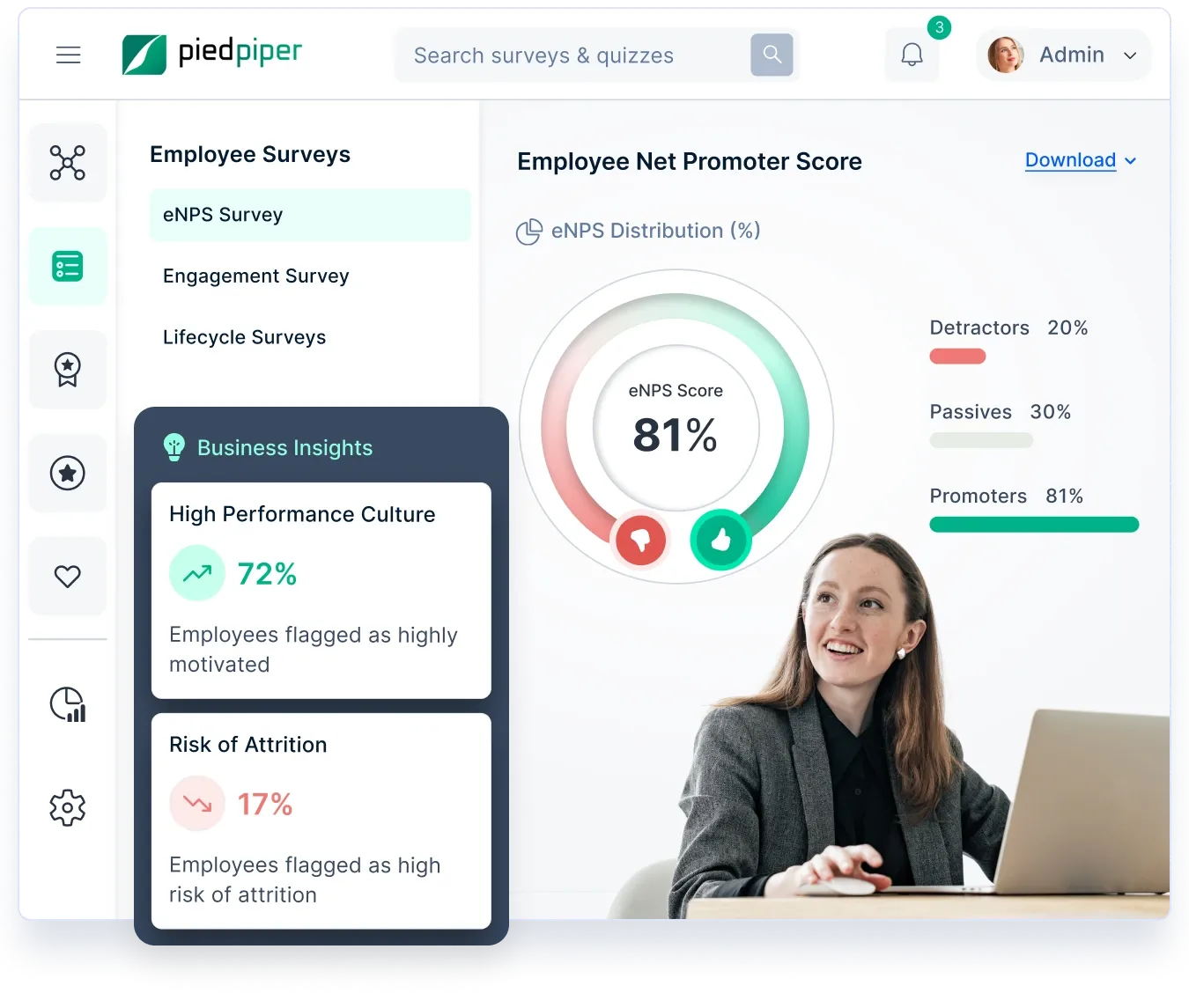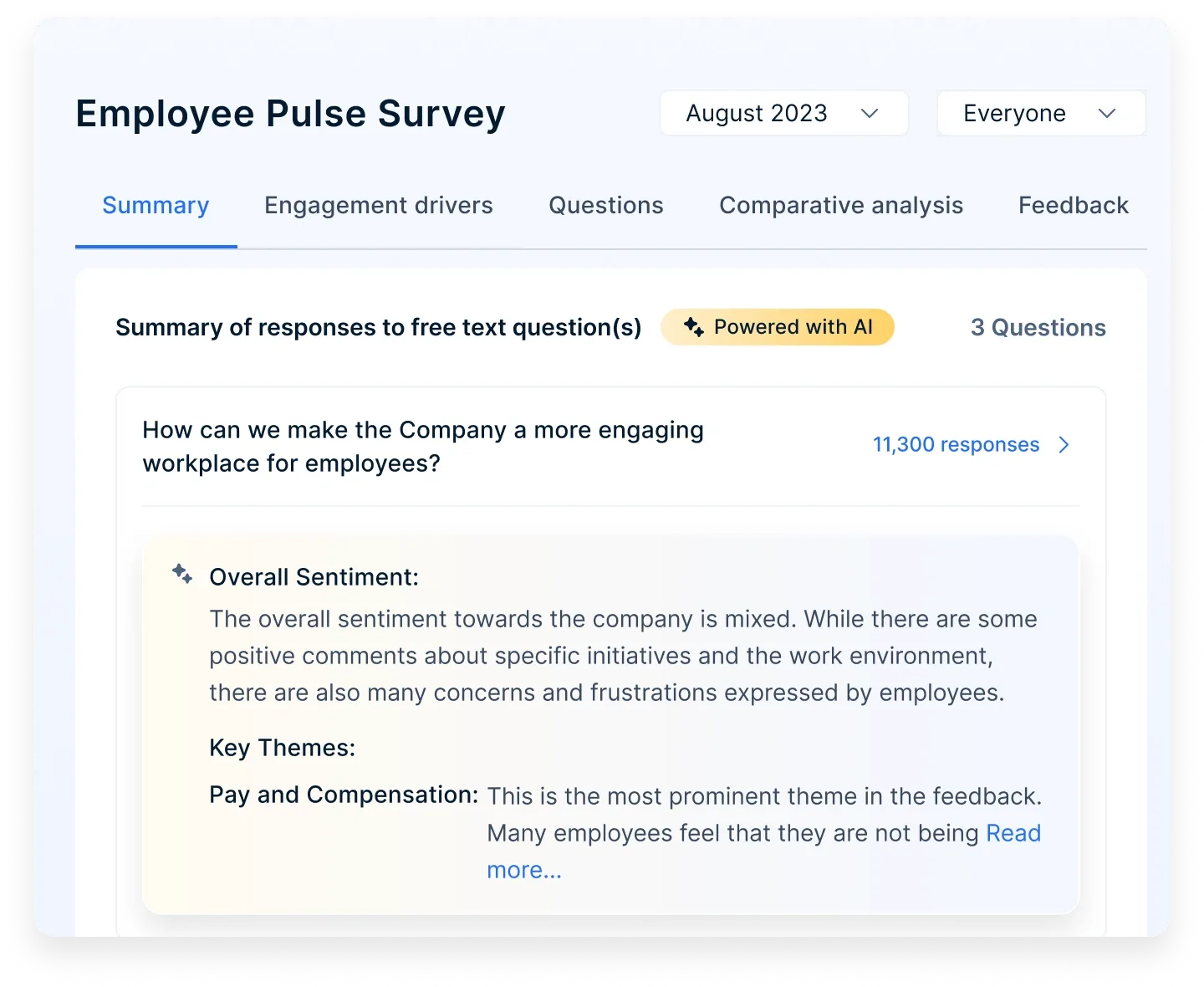Performance Appraisal Training for Staff: A Step-by-Step Guide to Building a High-Performing Workforce
Master performance appraisal training with our complete guide. Learn how to align goals, give feedback, and boost employee performance using Empuls tools.
On this page
- What is performance appraisal training?
- What are the key components of staff performance appraisal training?
- What are the benefits of performance appraisal training for employees?
- Why is it important to conduct a staff performance appraisal training?
- How to conduct a performance appraisal training for staffs with Empuls?
- Conclusion
- FAQs
Staff performance appraisal training is a fundamental component of any successful organization's talent management strategy. It serves as a bridge between employees' current performance and their potential for growth and development.
By providing constructive feedback, setting clear goals, and fostering open communication, staff performance appraisal training can empower employees to excel in their roles and contribute significantly to the organization's success.
In this blog, we will delve into the significance of staff performance appraisal training, its key components, and the benefits it brings to both employees and employers.
What is performance appraisal training?
Staff performance appraisal training, often referred to as performance appraisal or performance review training, is a structured process through which organizations evaluate their employees' work performance. It typically involves a series of meetings or discussions between managers and their subordinates to assess performance, set objectives, and identify areas for improvement.
What are the key components of staff performance appraisal training?
The key components of performance appraisal training for staffs includes the following:
- Goal setting: The appraisal process begins with setting clear and measurable performance goals for employees. These goals should be specific, achievable, and aligned with the organization's overall objectives.
- Feedback and evaluation: Managers provide employees with feedback on their performance, highlighting both strengths and weaknesses. This feedback should be constructive, specific, and based on objective criteria.
- Development plans: Following the evaluation, a development plan is often created to help employees address their weaknesses and enhance their strengths. This may include training, mentoring, or additional resources.
- Communication: Effective communication is crucial throughout the appraisal process. It should be a two-way dialogue, allowing employees to share their perspectives, concerns, and career aspirations.
- Documentation: accurate record-keeping is essential to track progress and maintain a record of employees' performance history. This documentation serves as a reference for future evaluations and decisions.
What are the benefits of performance appraisal training for employees?
Here are benefits of regularly conducting staff performance appraisal training.
- Improved performance: Regular appraisal training helps employees understand their strengths and weaknesses, motivating them to improve their performance.
- Goal alignment: It aligns individual goals with organizational objectives, ensuring that every employee contributes to the company's success.
- Employee engagement: Engaged employees are more likely to stay with an organization. Appraisal training fosters engagement by showing that the organization values its employees' growth and development.
- Skill enhancement: By identifying skill gaps and providing relevant training, staff performance appraisal training helps employees acquire new skills and knowledge, making them more valuable to the organization.
- Enhanced communication: The appraisal process encourages open and honest communication between managers and employees, leading to better working relationships and a more positive work environment.
- Informed decision-making: Performance appraisals provide valuable insights that can inform decisions related to promotions, salary adjustments, and talent retention strategies.
- Motivation and recognition: Recognizing and rewarding employees for their achievements during the appraisal process can boost morale and motivation.
These benefits can be leveraged with Empuls. Let’s check how Empuls brings advantage to you for the staff appraisal training.
Benefit | How Empuls enhances it |
Improved Performance | AI nudges + timely recognition increase motivation and output. |
Goal Alignment | Aligns personal goals with organizational vision through measurable KPIs. |
Engagement | Social recognition, interactive intranet, and employee-driven communities boost morale. |
Skill Enhancement | Training milestones linked to rewards encourage upskilling. |
Communication | Internal Townhalls, surveys, and real-time chat channels foster open feedback culture. |
Informed Decisions | Real-time analytics for HR and leadership on performance and sentiment. |
Motivation & Recognition | Peer-to-peer and manager awards celebrate every success, big or small. |
Why is it important to conduct a staff performance appraisal training?
Without proper appraisal training, performance reviews risk becoming unproductive, biased, or demotivating. Structured training ensures:
- Managers are confident in delivering feedback.
- Employees understand review criteria.
- Both parties are aligned on expectations and next steps.
Now that we have covered why it is important, let us get onto the “how” part.
How to conduct a performance appraisal training for staffs with Empuls?
Conducting performance appraisal training is critical to preparing your workforce for effective and meaningful performance reviews. With Empuls, organizations can streamline the entire training process—ensuring managers and employees alike are well-equipped to participate confidently and constructively.
Here’s a step-by-step guide on how you can use Empuls to conduct employee performance appraisal training efficiently.
1. Launch pre-training surveys to gauge readiness
Begin by running pulse or lifecycle surveys through Empuls to understand how prepared your team is for appraisal discussions. These insights help tailor the performance appraisal training for employees and managers based on existing knowledge gaps.

2. Share training content via the social intranet
Use Empuls' interactive intranet features to distribute key learning materials. Share content like appraisal handbooks, role-based case studies, videos, and performance metrics guidelines to both managers and employees. Leverage rich media posts to make content engaging and easy to digest.

3. Conduct virtual workshops and live sessions
Organize appraisal workshops and webinars directly through Empuls using "Ask-Me-Anything" sessions. This is particularly effective for performance appraisal training for managers who need to master giving constructive feedback and managing difficult conversations.
4. Simulate role-plays and mock evaluations
Facilitate peer-to-peer mock sessions where participants act as appraisers and appraisees. This helps the appraisal team gain practical exposure to the appraisal process. Empuls communities can host these sessions and encourage team-based feedback.
5. Use automated nudges to build appraisal habits
Empuls’ AI assistant, Em, can automatically nudge employees to record achievements, update goals, and prompt managers to acknowledge efforts. This is particularly useful in reinforcing appraisal training for managers, helping them adopt a consistent feedback loop.

6. Assess knowledge retention with interactive tools
After the training sessions, run quizzes or polls to test what participants have learned. Use Empuls analytics to track engagement and identify if further performance appraisal training for employees or managers is required.
7. Encourage continuous learning and support
Provide ongoing resources via Empuls’ knowledge base and intranet. Continue using pulse surveys and interactive forums to address recurring challenges. This ensures the appraisal team remains aligned and engaged throughout the performance review cycle.
8. Monitor effectiveness with people analytics
Empuls offers deep people analytics to assess the impact of the employee performance appraisal training program. Monitor participation, feedback quality, and goal alignment metrics to fine-tune future training cycles.

Conclusion
Staff appraisal training is a valuable tool for nurturing employee growth, enhancing performance, and achieving organizational success. When implemented thoughtfully and consistently, it can create a culture of continuous improvement and contribute to a motivated, engaged, and high-performing workforce.
With Empuls, organizations can turn performance appraisal training into a seamless, data-driven, and collaborative experience. Whether you're delivering performance appraisal training for managers or rolling out a company-wide appraisal training for employees, Empuls empowers your team with the tools they need to drive clarity, accountability, and growth throughout the appraisal process.
FAQs
1. How to appraise staff performance?
To appraise staff performance effectively, follow these steps:
- Set clear goals and KPIs aligned with company objectives.
- Monitor progress regularly through measurable outcomes.
- Gather feedback from peers, subordinates, and managers.
- Conduct appraisal meetings to review achievements, challenges, and growth areas.
- Provide constructive feedback, recognize accomplishments, and discuss development plans.
- Document the review and track performance over time for future reference.
2. What is appraisal training?
Appraisal training is a structured program that equips managers and employees with the skills to conduct or participate in performance appraisals effectively. It includes training on goal-setting, giving and receiving feedback, using appraisal tools, and managing performance conversations. It helps ensure that the performance review process is fair, objective, and development-focused.
3. How to write a performance review training?
To write a performance review training program:
- Define learning objectives (e.g., giving feedback, setting SMART goals).
- Identify your audience (managers, employees, or both).
- Create training content like presentations, handouts, case studies, and feedback frameworks.
- Include practice sessions such as role-plays or mock reviews.
- Add assessments or quizzes to test understanding.
- Provide follow-up support through guides, checklists, or refresher sessions.


















